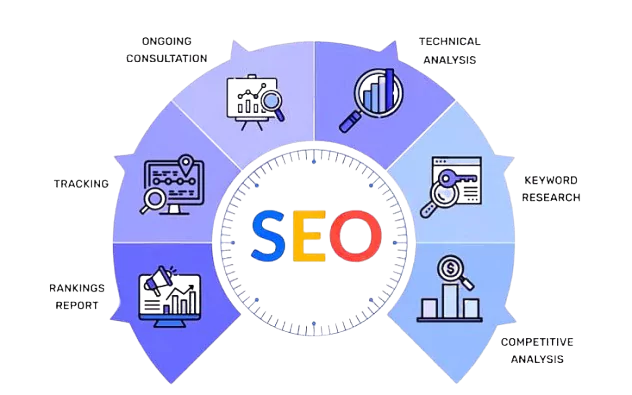Table of Contents
- The Power of SEO in Digital Marketing: Unlocking Success for your Business
- What is SEO and why is SEO important in digital marketing?
- The impact of SEO on website visibility and organic traffic
- Understanding search engine algorithms and ranking factors
- Some of the key ranking factors that search engines consider include:
- Keyword research and optimization for SEO
- On-page SEO techniques for website optimization
- Off-page SEO strategies to boost online presence
- Technical SEO: Optimizing website structure and performance
- Conclusion: Embracing SEO to drive business growth and success
The Power of SEO in Digital Marketing: Unlocking Success for your Business
In today’s online environment, understanding what is the importance of SEO in digital marketing is crucial for any business aiming to excel online. Search Engine Optimization (SEO) is a cornerstone of digital marketing that drives organic traffic, enhances visibility, and helps businesses connect with their target audience. If you’re asking what is the importance of SEO in digital marketing, you’ll find it’s key to unlocking success by improving your online presence.
SEO is vital in digital marketing as it boosts your website’s ranking in search engine results, leading to increased organic traffic. Recognizing what is the importance of SEO in digital marketing helps you grasp how it amplifies your visibility to potential customers. It’s not just about keywords and rankings; it involves creating valuable content, understanding your audience, and forging meaningful connections.
SEO in digital marketing is essential for staying ahead of competitors and adapting to the dynamic digital environment. By optimizing your website and content, you improve not only your search engine rankings but also the overall user experience, which is crucial for sustainable success.
What is SEO and why is SEO important in digital marketing?
Search Engine Optimization (SEO) is the process of optimizing your website and its content to improve its visibility and ranking in search engine results. Understanding what is the importance of SEO in digital marketing is crucial as it helps businesses and websites be discovered by their target audience through organic search.
In today’s digital landscape, search engines like Google, Bing, and Yahoo have become the primary gateway for consumers to find information, products, and services online. When a user searches for a specific query, search engines use complex algorithms to crawl, index, and rank the most relevant and authoritative websites. By implementing effective SEO strategies, businesses can ensure their website appears higher in these search engine results. This makes it more likely for potential customers to find and engage with their brand, highlighting what is the importance of SEO in digital marketing for overall success.

The impact of SEO on website visibility and organic traffic
One of the most significant benefits of SEO is its ability to improve a website’s visibility in search engine results. When a website is properly optimized for search engines, it is more likely to appear on the first page of search results, which is where the majority of users tend to click. This increased visibility can lead to a significant increase in organic traffic, as users are more likely to visit a website that appears higher in the search engine rankings.
Organic traffic, which is the traffic that comes to a website through unpaid search engine results, is particularly valuable for businesses. Unlike paid advertising, where businesses have to continuously invest in order to maintain their visibility, organic traffic is more sustainable and cost-effective in the long run. By investing in SEO, businesses can build a solid foundation of organic traffic that can continue to drive leads and sales for years to come.
Moreover, SEO can also help businesses to reach a wider audience. By optimizing their website for a variety of relevant keywords and search queries, businesses can ensure that their website is found by a broader range of potential customers. This can be especially beneficial for businesses that operate in niche or highly competitive markets, where standing out from the competition can be a significant challenge.
Understanding search engine algorithms and ranking factors
To effectively leverage the power of SEO, it is crucial to understand how search engines work and the factors that influence their ranking algorithms. Search engines like Google, Bing, and Yahoo use complex algorithms to crawl, index, and rank websites based on a variety of factors, including the quality and relevance of the content, the website’s technical structure, and the strength of its backlink profile.
Some of the key ranking factors that search engines consider include:
By understanding these ranking factors and how they are weighted by search engines, businesses can develop a more targeted and effective SEO strategy to improve their website’s visibility and drive more organic traffic.
- Content quality and relevance: Search engines prioritize websites that provide high-quality, informative, and relevant content that addresses the user’s search query.
- Keyword optimization: The strategic use of relevant keywords in the website’s content, meta tags, and URL structure can signal to search engines the topic and focus of the website.
- Website structure and navigation: A well-organized and user-friendly website structure, with clear navigation and internal linking, can improve the website’s crawlability and indexability.
- Mobile-friendliness: With the increasing use of mobile devices for online searches, search engines now heavily weigh a website’s mobile-friendliness and responsiveness.
- Page speed and performance: Websites that load quickly and provide a seamless user experience are more likely to rank higher in search engine results.
- Backlink profile: The number and quality of external websites that link back to a website can be a strong indicator of its authority and credibility.
Keyword research and optimization for SEO
Keyword research is the foundation of any successful SEO strategy. It involves identifying the specific words and phrases that your target audience is searching for, and then optimizing your website and content to rank for those keywords.
Effective keyword research starts with understanding your target audience, their pain points, and the questions they are asking. Tools like Google Keyword Planner, Ahrefs, and SEMrush can help you uncover relevant keywords, analyze their search volume, and assess the level of competition. By focusing on a mix of high-volume, low-competition keywords, as well as long-tail, more specific keywords, you can create a comprehensive keyword strategy that aligns with your business goals.
Once you have identified the most relevant keywords, it’s time to optimize your website and content to rank for those terms. This includes incorporating the keywords into your page titles, meta descriptions, header tags, and body content, while ensuring that the content is informative, engaging, and provides value to your audience. Additionally, you can create dedicated landing pages or blog posts that target specific keywords, further improving your chances of ranking higher in search engine results.
On-page SEO techniques for website optimization
While on-page SEO focuses on optimizing the elements within your website, off-page SEO involves strategies and tactics that take place outside of your website to improve its visibility and authority in search engine results. Understanding what is the importance of SEO in digital marketing includes recognizing the impact of off-page SEO.
One of the most important off-page SEO strategies is link building, which involves acquiring high-quality backlinks from other reputable websites. Search engines view these backlinks as endorsements of your website’s content and authority, making link building a key component of what is the importance of SEO in digital marketing. Effective link-building strategies include guest posting, broken link building, and outreach to industry influencers and partners.
Another crucial off-page SEO tactic is social media engagement. By actively sharing your content on social media platforms and engaging with your audience, you can increase your brand’s visibility and build a stronger online presence. This enhances what is the importance of SEO in digital marketing, leading to more referral traffic and improved search engine rankings, as social signals are becoming increasingly important in search engine algorithms.
Additionally, optimizing the website’s URL structure, image alt text, and internal linking can all contribute to improved on-page SEO pLocal SEO is also a vital component of off-page SEO, particularly for businesses that serve a specific geographic area. By optimizing your Google My Business listing, creating local citations, and building a strong presence on local directories, you can improve your visibility in local search results and attract more customers in your area. This highlights what is the importance of SEO in digital marketing for businesses aiming to reach a local audience.
Off-page SEO strategies to boost online presence
While on-page SEO focuses on optimizing the elements within your website, off-page SEO involves the strategies and tactics that take place outside of your website to improve its visibility and authority in search engine results. Understanding what is the importance of SEO in digital marketing encompasses recognizing how off-page SEO contributes to your overall strategy.
One of the most important off-page SEO strategies is link building, which involves acquiring high-quality backlinks from other reputable websites. Search engines view these backlinks as endorsements of your website’s content and authority, which is central to what is the importance of SEO in digital marketing. Effective link-building strategies include guest posting, broken link building, and outreach to industry influencers and partners.
Another crucial off-page SEO tactic is social media engagement. By actively sharing your content on social media platforms and engaging with your audience, you enhance what is the importance of SEO in digital marketing. This can lead to increased referral traffic and improved search engine rankings, as social signals are becoming increasingly important in the eyes of search engines.
Local SEO is also a vital component of off-page SEO, particularly for businesses that serve a specific geographic area. By optimizing your Google My Business listing, creating local citations, and building a strong presence on local directories, you address what is the importance of SEO in digital marketing for local visibility and customer attraction.
Technical SEO: Optimizing website structure and performance
While on-page and off-page SEO strategies are crucial for improving a website’s visibility and rankings, technical SEO is equally important in ensuring that search engines can effectively crawl, index, and understand your website. Technical SEO involves optimizing the underlying structure, code, and performance of your website to make it more search engine-friendly.
One of the key aspects of technical SEO is ensuring that your website’s architecture is well-organized and easy to navigate. This includes implementing a clear and intuitive URL structure, creating a logical hierarchy of pages, and using internal linking to guide users and search engines through your website. Additionally, ensuring that your website is mobile-friendly and responsive is crucial, as more and more searches are being conducted on mobile devices.
Another critical component of technical SEO is optimizing website speed and performance. Search engines prioritize websites that load quickly and provide a seamless user experience. By optimizing image and file sizes, minimizing redirects, and leveraging caching and compression techniques, you can significantly improve your website’s loading times and enhance its overall performance.
Technical SEO also involves ensuring that your website is properly indexed and crawled by search engines. This includes submitting sitemaps, implementing robots.txt files, and monitoring for any crawl errors or indexing issues. By addressing these technical elements, you can ensure that search engines can effectively understand and rank your website, ultimately driving more organic traffic and improving your overall digital marketing success.
Conclusion: Embracing SEO to drive business growth and success
In the digital age, the power of SEO cannot be overstated. In this article we discussed about, what is the importance of SEO in Digital Marketing. By optimizing your website and online presence for search engines, you can unlock the potential for unparalleled business growth and success. Through the strategic implementation of SEO techniques, you can increase your website’s visibility, drive more organic traffic, and ultimately, generate more leads and sales. Whether it’s through keyword research, on-page optimization, off-page strategies, or technical improvements, SEO is the key to standing out in a crowded online marketplace.
But SEO is not a one-time fix; it’s an ongoing process that requires continuous monitoring, analysis, and adaptation. As search engine algorithms evolve and user behavior changes, businesses must stay agile and be willing to adapt their SEO strategies to stay ahead of the competition. By embracing the power of SEO and making it a core component of your digital marketing efforts, you can position your business for long-term success and growth. So, what are you waiting for? Start unlocking the true potential of your business through the transformative power of SEO by contacting a Digital Marketing Agency in Kochi, Kerala.


